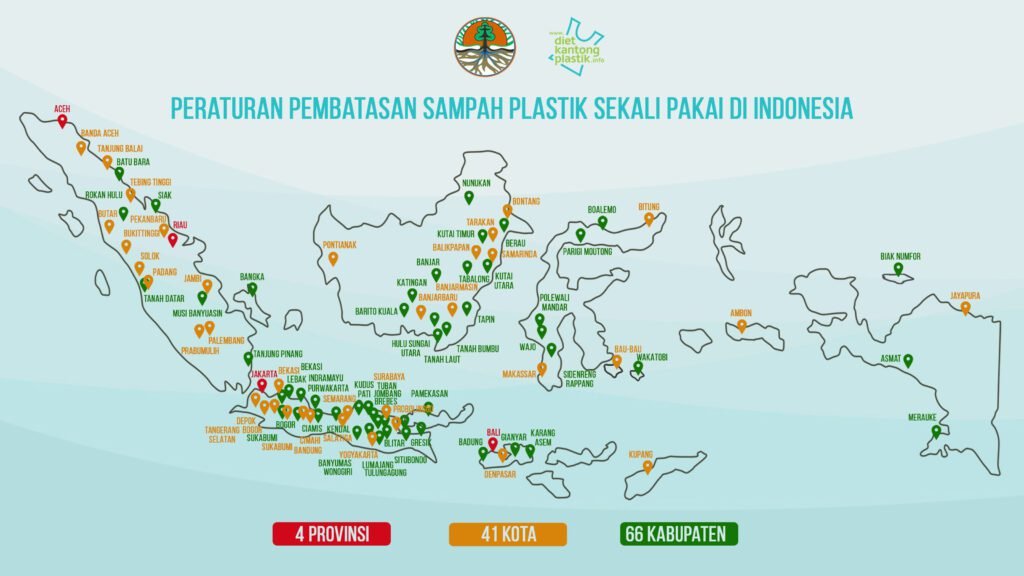SEA of Solutions (SoS) is an initiative of the United Nations Environment Programme (UNEP) and the Coordinating Body on the Seas of East Asia (COBSEA) to address plastic pollution at its source, foster partnerships, and showcase best practices and latest trends since 2019. This year, by utilizing the momentum of the Global Plastics Treaty, SoS 2024 carries the theme ‘Delivering Actions to End Plastic Pollution’, which examines evidence-based science and action, policy and regulatory measures, finance and investment, circularity in the plastic value chain, and community engagement for behavioural change driven by sustainable and systemic change, primarily through strengthening inclusive upstream regulations.
Plasticdiet Indonesia, represented by Rahyang Nusantara as the Deputy Director, also participated in the SoS knowledge session on ‘Preventing Plastic Leakage Trough City’. On this occasion, Rahyang explained the number of cities, districts and provinces in Indonesia that already have regulations prohibiting single-use plastics, of which two provinces have succeeded in reducing the use of single-use plastics by 80% in Jakarta Province and 70% in Bali Province.

Furthermore, to contribute to creating solutions to the plastic waste problem, Rahyang also explained how Plasticdiet Indonesia has also played a role in prioritizing reuse solutions through the implementation of several programs aimed at encouraging the reduction of single-use plastics at the regional, national, and international levels.
Plastic Free Market and Reuse Movement
At the regional level, Plasticdit Indonesia has carried out several initiatives in line with the Regulation of the Minister of Environment and Forestry No. P75/2019 concerning the Roadmap for Waste Reduction by Producers, which targets the prohibition of several types of single-use plastics as of January 1, 2030. The initiatives carried out include the Plastic Free Market and Reuse Movement programs, which prioritize reuse as a solution to replace single-use plastics in traditional markets, online shopping, or shopping activities in general. The reuse included in this program is not only about finding a replacement for single-use packaging and/or items, but also about how to form a system that involves producers, distributors, consumers, and existing waste management systems. This reuse system is also projected as a low-emission system, which can contribute to climate change mitigation.
Improving the Reuse Ecosystem in Indonesia Through the Reuse Special Interest Group
To levelling up the efforts from the regional level, Dietplastik Indonesia also formed a Reuse Special Interest Group consisting of various agencies and business actors who encourage the formation and implementation of a comprehensive reuse system in Indonesia. One of the achievements made by the Reuse Special Interest Group is the issuance of the Regulation of the Food and Drug Supervisory Agency (PerBPOM) Number 12 of 2023 concerning Supervision of the Manufacture and Distribution of Cosmetics which mentions the provisions for several types of refill cosmetics. In addition, the Reuse Special Interest Group has also issued a document ‘Recommendations to a Zero Draft Global Plastic Treaty’ to the Indonesian government to be able to strengthen the reuse solution in the Global Plastic Treaty.
Establishing the Asia Reuse Consortium to Strengthen Reuse Initiatives in the Asia Region
Initiated by Plasticdiet Indonesia, GAIA Asia Pacific, and Break Free From Plastic and supported by PR3-The Global Alliance To Advance Reuse, the Asia Reuse Consortium consisting of civil society organizations, companies and local governments from Indonesia, the Philippines, Viet Nam, Thailand, and India has a mission to promote the reuse system through joint development of reuse standards, capacity building for reuse entrepreneurs, and strengthening the country’s stance on the reuse system in the Global Plastics Treaty. This consortium is also one of the real proofs that Asia has many initiatives and resources to address single-use plastic pollution through the reuse ecosystem.
Plasticdiet Indonesia also participated in the exhibition by displaying three publication documents, including documents (1) Guidelines for the Preparation of Single-Use Plastic Restriction Regulations, (2) Implementation of Single-Use Plastic Restriction Regulations in Several Provinces and Cities in Indonesia, and (3) Evaluation of the Environmental and Social Impact of the Utilization of Sachets and Pouches and Expansion of Reuse Solutions in Jakarta Greater Area. It is hoped that Plasticdiet Indonesia’s contribution to the SoS 2024 activity can show the public that Indonesia, and other Asia region countries, are home to a wealth of reuse solutions that contribute to overcoming single-use plastic pollution.

